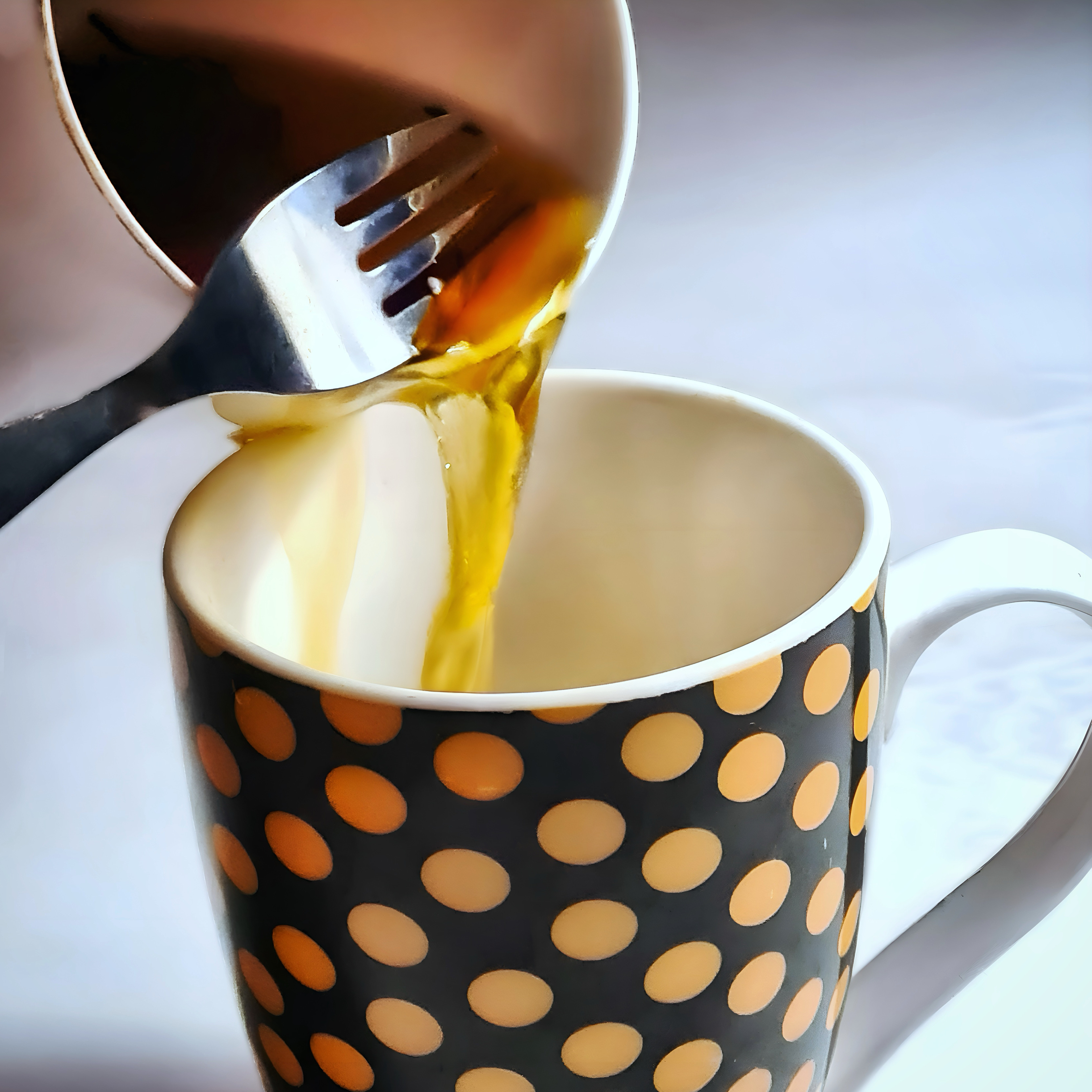Imagine this: you have just finished brushing your teeth before going to bed, and you feel a sudden craving for a cup of tea. You wonder: will drinking tea ruin my teeth after brushing? Will it ruin my oral hygiene? Will it stain my teeth or affect my enamel? Or will it actually benefit my oral health?
If you are a tea lover, you might have faced this dilemma at some point in your life. So today we will explore the pros and cons of drinking tea after brushing your teeth, and provide some tips and best practices for tea enthusiasts who want to enjoy their brew without compromising their oral health!

Oral Health and Hygiene
Oral health is arguably one the most important parts of your overall well-being. It affects not only your appearance and confidence, but also your ability to eat, speak, and smile. Poor oral health can lead to tooth decay, gum disease, bad breath, and even systemic infections and diseases. Since drinking tea can affect your oral health, it is important to take on-board certain considerations when drinking and brushing. Especially if you are a regular tea addict!
One of the most important habits for maintaining good oral health is brushing your teeth regularly. This is because brushing your teeth removes plaque, a sticky film of bacteria that forms on your teeth and gums. Plaque can cause cavities, gingivitis, and periodontitis if left untreated. Brushing your teeth also helps to prevent bad breath and keep your teeth white and shiny.
Impact of Food and Drinks After Brushing Your Teeth
Brushing your teeth is not enough to keep your oral health in check. You also need to pay attention when eating and drinking (including tea), especially after brushing your teeth. Some foods and drinks can have a negative impact on your oral health, such as:
• Sugary foods and drinks
Sugar feed the bacteria in your mouth, which produce acids that erode your enamel and cause cavities. The more often you consume sugar, the more damage you cause to your teeth. So it’s important to try and limit your sugary food and drink intake. Make sure to rinse your mouth with water after consuming sugar, especially if you’re someone who likes sugar with tea!
• Acidic foods and drinks
Acidic foods and drinks such as citrus fruits, tomatoes, vinegar, and carbonated beverages. These can also weaken your enamel and make your teeth more prone to decay and sensitivity. You should avoid or minimize your consumption of acidic foods and drinks, and wait at least 30 minutes before brushing your teeth after eating or drinking them. This may apply to someone who loves to add lemon, lime, and other fruits to their teas.
• Staining foods and drinks
Staining foods and drinks can stain your teeth, such as coffee, certain types of tea, wine, berries, and sauces. These foods and drinks contain pigments that can adhere to your enamel and discolor it over time. You should consider brushing your teeth or rinsing your mouth with water after consuming staining foods and drinks. Keep reading and we will discuss the types of teas which are more prone to staining.
Dentist Recommendations:
The American Dental Association (ADA) recommends brushing your teeth twice a day, for two minutes each time with a soft-bristled toothbrush, and a fluoride toothpaste. You should also floss your teeth at least once a day. This is affective at removing plaque and food particles from between your teeth and under your gumline.

How Tea Affects Oral Health:
There are many types of tea to consider, such as black, green, white, oolong, and herbal. To understand if drinking tea after brushing teeth is wise, it’s important to know the various natural compounds of tea. These attributes can ultimately have different effects on your oral health. For Example:
1. Fluoride
Tea is a natural source of fluoride, which can help to prevent tooth decay. Fluoride helps by strengthening your enamel and making it more resistant to acid attacks. However, too much fluoride can also cause dental fluorosis, a condition that causes white or brown spots on your teeth. The amount of fluoride in tea depends on the type, quality, and brewing method of the tea, as well as the water source. So you should be careful not to consume too much tea, especially if you already use fluoride toothpaste.
2. Tannins
Tea also contains tannins, which are plant polyphenols that have antioxidant and anti-inflammatory properties. Tannins can help to prevent the growth of plaque-causing bacteria and reduce the risk of gum disease. However, tannins can also stain your teeth, especially if you drink black tea or other dark-colored teas.
Tannins can also interfere with the absorption of iron from your diet, which can cause anemia in some people. You should be brushing your teeth or rinsing your mouth with water after drinking tea. Additionally, avoid drinking tea with meals that contain iron-rich foods to avoid this problem.
3. Acidity
Tea is slightly acidic, with a pH ranging from 4.9 to 7.2, depending on the type and brewing method of the tea. Acidity can erode your enamel and make your teeth more sensitive to temperature and pressure. However, acidity can also help to kill harmful bacteria and prevent infections in your mouth. To avoid this, you should try not to drink tea that is too hot, too cold, or too strong. Make sure to wait at least 30 minutes before brushing your teeth after drinking tea.
Benefits of Tea for Oral Health:
Despite some potential drawbacks, tea can also have some positive effects on your oral health, such as:
1. Antibacterial properties
Tea can inhibit the growth of Streptococcus mutans, the main bacteria responsible for tooth decay, as well as other harmful bacteria that cause bad breath and gum disease. Not just this, tea can prevent the adhesion of bacteria to your teeth and gums. This can make it harder for teeth to form plaque and tartar. Lastly, tea can help reduce the production of acids by bacteria, which can damage your enamel and cause cavities.
2. Anti-inflammatory properties
Tea can also reduce inflammation and swelling in your gums, preventing or alleviating symptoms of gingivitis and periodontitis. Additionally, tea can modulate your immune system and help your body fight against infections and diseases in your mouth.
3. Potential benefits for gum health
Some studies have suggested that tea can improve your gum health by increasing the blood flow to your gums. This can enhance the healing of wounds, ulcers, and stimulating the production of collagen, a protein that supports your gum tissue. Another benefit of drinking tea is that it can reduce the risk of oral cancer. This is because it prevents the formation of free radicals and induce apoptosis, or programmed cell death, in cancer cells.

Potential Concerns When Drinking Tea after Brushing
As you can see, tea has both pros and cons for your oral health. However, the question of whether drinking tea after brushing is not so simple. There are some potential concerns that you should be aware of, such as:
1. Staining
One of the most obvious and common problems with drinking tea after brushing your teeth is staining. Tea contains tannins, which can adhere to your enamel and discolor it over time. This can make your teeth look yellow, brown, or gray, depending on the type and amount of tea you drink.
Staining can be prevented or reduced by brushing your teeth or rinsing your mouth with water after drinking tea. Additionally, using whitening products or treatments to restore your teeth’s natural color.
2. Acidity
Another potential issue with drinking tea after brushing your teeth is acidity. As mentioned before, tea is slightly acidic, and it can weaken your enamel and make your teeth more prone to decay and sensitivity. This can cause pain and discomfort when you eat or drink hot, cold, sweet, or sour foods or drinks. Also increasing the risk of cavities and infections.
Acidity can be avoided or minimized by waiting at least 30 minutes before brushing your teeth after drinking tea. Moreover, using a fluoride toothpaste or mouthwash to strengthen your enamel and protect it from acid attacks.
3. Interaction with toothpaste ingredients
A third possible problem with drinking tea after brushing your teeth is the interaction with toothpaste ingredients. Toothpaste contains fluoride, which is a mineral that strengthens your enamel and prevents tooth decay. However, tea contains tannins, which can bind to fluoride and reduce its availability and effectiveness. This can make your teeth more vulnerable to acid erosion and bacterial infection, and it can also reduce the benefits of fluoride for your oral health.
Interaction with toothpaste ingredients can be prevented or reduced by waiting at least 30 minutes before drinking tea after brushing your teeth. It’s important to use a toothpaste that contains a high concentration of fluoride or other ingredients that can enhance its action. For example, xylitol or triclosan.
Expert Opinions on Drinking Tea and Brushing Teeth?
So, what do the experts say about drinking tea after brushing your teeth? Well, there is no definitive answer, as different dentists and oral health experts may have different opinions and recommendations. It all depends on the type and amount of tea you drink, your oral health condition, and your personal preferences. However, here are some general guidelines and tips that you can follow, based on the consensus of most experts:
1. Drink tea in moderation
As with most things in life, moderation is essential. Drinking too much tea can have negative effects on your oral health, such as staining, acidity, and fluorosis. The recommended daily intake of tea varies depending on the type and strength of the tea. Generally, it is advisable to limit your consumption to 3 to 4 cups a day. You should also avoid adding sugar, honey, or lemon to your tea, as these can increase the risk of decay and erosion.
2. Drink tea at the right time
Timing is also important when it comes to drinking tea and brushing your teeth. Ideally, you should drink tea before brushing your teeth, as this can help to rinse away any food particles and plaque from your mouth. However, if you prefer drinking tea after brushing your teeth, you should wait at least 30 minutes before doing so. Doing this can allow your saliva to neutralize the acidity and remineralize your enamel. You should also avoid drinking tea right before going to bed, as this can increase the chances of staining and decay overnight.
3. Drink tea of the right type
Not all teas are created equal when it comes to your oral health. Some teas are better or worse than others, depending on their properties and ingredients. Generally, herbal teas are the best option, as they are less acidic, less staining, and more beneficial for your oral health.
For example, chamomile tea can soothe inflammation and irritation in your gums. Peppermint tea can freshen your breath and prevent bad breath, and green tea can reduce plaque and bacteria and prevent cavities and gum disease. On the other hand, black tea is the worst option, as it is more acidic, more staining, and less beneficial for your oral health. You should avoid or limit your intake of black tea, especially after brushing your teeth.
4. Drink tea with care
How you drink your tea can also affect your oral health, especially after brushing your teeth. You should avoid drinking tea that is too hot, too cold, or too strong, as these can irritate your mouth and damage your enamel. Also, avoid sipping your tea slowly or holding it in your mouth for too long. This can actually increase the exposure of your teeth to the tea and its effects. So you should drink your tea quickly and in small amounts, and rinse your mouth with water after drinking it.
Conclusion
To sum up, drinking tea after brushing your teeth is not a simple yes or no question. It depends on many factors, such as the type, amount, and timing of the tea, the condition and sensitivity of your teeth, and your personal preferences and habits. Tea can have both positive and negative effects on your oral health, so you should weigh the pros and cons carefully before making your decision.
We hope that this article has helped you to answer the question of drinking tea after brushing teeth, and to unveil the do’s and don’ts. If you have any questions, comments, or experiences to share, please feel free to leave them below. We would love to hear from you!
Discover More Tea-Related Articles:
- Tea for Constipation Relief: The Best Teas to Make You Poop
- Earl Grey Lemonade – A Simple and Zesty Iced Tea
- Arnold Palmer Recipe: The Best Sweet Tea & Lemonade drink
- Korean Pomegranate Tea: The Simple Guide to ‘Seoklyu Cha’
- Lilac Tea: How to Harvest, Brew, and Serve This Fragrant Tea
Sources:
- Tea | The Nutrition Source | Harvard T.H. Chan School of Public Health
- Cultivation, Improvement, and Environmental Impacts of Tea | Oxford Research Encyclopedia of Environmental Science
- Culturing better tea research – Nature
- Herbal Teas and their Health Benefits: A Scoping Review
- The Benefits and Risks of Consuming Brewed Tea: Beware of … – Hindawi
- Action on sugar – Sugar and teeth





Leave a Comment